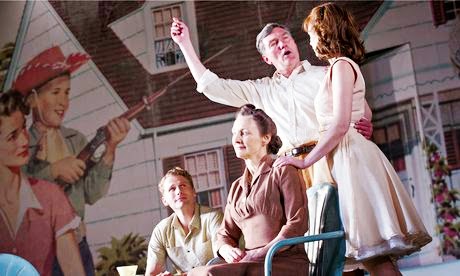'All My Sons' review or 'Who wants to be a hero?'
‘All My Sons’, Arthur Miller
Regent’s Park Open Air Theatre, 21st May 2014
I had my doubts about this
one. For me, ‘All My Sons’ belongs indoors. It’s a clenched fist of a play
which needs walls to bounce off, not the vast expanse of an open air theatre.
Regent’s Park is for musicals and magic and another bloody ‘Midsummer Night’s
Dream’! But Timothy Sheader has – impressively - managed to pull this one off.
His show takes a while to get going but, as dusk falls and the shadows
lengthen, this transforms into a darkly persuasive production.
Lizzie Clachlan’s set is a touch
too try-hard for my liking. A 50s style billboard lines the back of the stage,
on which a beaming father and his happy family hover above a fine American
house. At the front of the stage, a tree bursts through the boards. Its huge
roots span the breadth of the stage and swarm beneath the actors’ feet. It
feels a little heavy handed, as if we’re being bashed over the head with the
terrible but hidden frailty of the American Dream.
Miller’s plays are loud enough
as it is and the set, for me, is a bit overdone. Miller’s themes are hard to
miss and I’m not convinced we need such loud visual reminders. It’s also pretty
distracting to have all those roots crawling about our eye-line. They get in
the way of the actors and, for a while, it’s hard to connect with them. The
opening scenes feel a little limp and the performances, distant.
But Miller isn’t one to hang
around and the tension quickly ratchets up, overcoming the design and infusing
the performances with purpose. There’s a thrilling tingle to the first half, as
Joe Keller’s ugly past quietly creeps up on him. The play opens on a lazy
Sunday afternoon, with Joe (Tom Mannion) and his son Chris (Charles Aitken)
reading the papers. Subtle sparks of sadness and fear flicker around Joe’s
supposed sense of calm. The tree planted in memory of Joe and wife Kate’s dead
son Larry – a fighter pilot of died in WWII – broke only last night. A little
lad keeps scampering about and asking Joe about prison. Neighbours constantly intrude
and they don’t all seem friendly.
Tom Mannion is much less
jovial than the last Joe Keller I saw, played by David Suchet. It is only as the
plot gets heavier, and Joe’s past begins to close in on him, that Mannion’s Joe
livens up. The biggest shift in Joe’s behaviour comes with the arrival of Ann (a
luminous Amy Nuttall), the girlfriend of Joe’s dead son Larry and soon to
be fiancé of Joe’s other son, Chris. As soon as Ann arrives – along with all
the buried memories she represents – Joe becomes palpably animated.
The more tense things get, the more of a performance Joe’s life becomes.
There is a fascinating moment when
Joe recalls his release from prison, after he is accused of selling dodgy parts
for fighter planes. Joe describes parking some way from his house and performing
for his neighbours, who are gathered and gawking on the streets. As Joe recounts
this moment, his back straightens and his voice grows stronger. We watch as Joe’s
performance of innocence visibly emboldens him.
Supported by his wife Kate (Bríd Brennan), Joe almost gets away with this performance of innocence, which is so powerfully propped up by the wealth he possesses and the handsome family he protects. Brennan is a tough-skinned and calculated Kate Keller – much more so than Zoe Wannamaker’s interpretation. With Wannaker’s open-hearted performance, Kate was the broken soul at play's centre. She was the wounded bird the whole family was afraid to crush. In this production, Brennan’s Kate is a little like Lady Macbeth. She glides about the stage, sorrow streaming out behind her. When Kate touches young Ann, it’s as if Ann is being stroked by a ghost.
Later, when Ann’s brother,
George, turns up at Joe’s home ‘with blood in eyes’ and revenge on his mind,
Brennan’s Kate coolly manipulates him. She smothers and teases him and enfolds
him in a rather mechanical matriarchal embrace. With Wanamaker, it felt like
her love for her dead son was so huge, it spilled over onto everyone she met. With
Brennan’s Kate, her instinct for self preservation seems much stronger than her
sorrow. It is a powerful interpretation but, for me, a touch hard-hearted for a
play that hinges on the strength of a mother’s love for her child.
Despite this slightly cold interpretation, this is still a powerful and subtle
production. There are no easy answers here and the actors wrestle – brilliantly
- with the compromises their characters embody. Sad and necessary
contradictions flare up. Joe’s pride and protectiveness gradually
infects his family with shame. Kate’s will to survive rips the family apart
and Chris’ idealism pushes everyone towards failure. Impossible
idealism and inevitable flaws knock up against each other as Miller achieves
the one thing that Joe begs for: ‘See it. See it human.’



Comments
Post a Comment